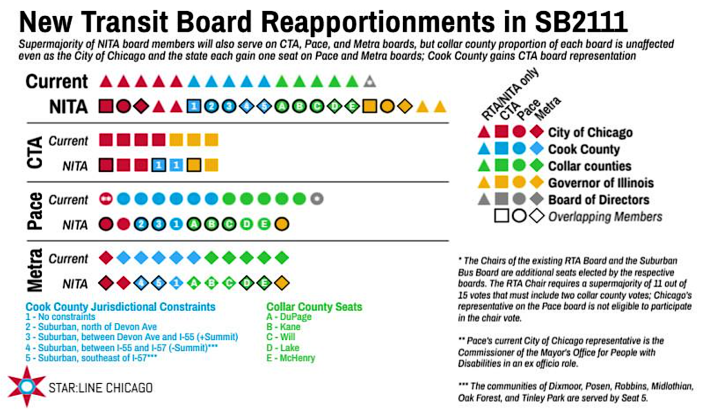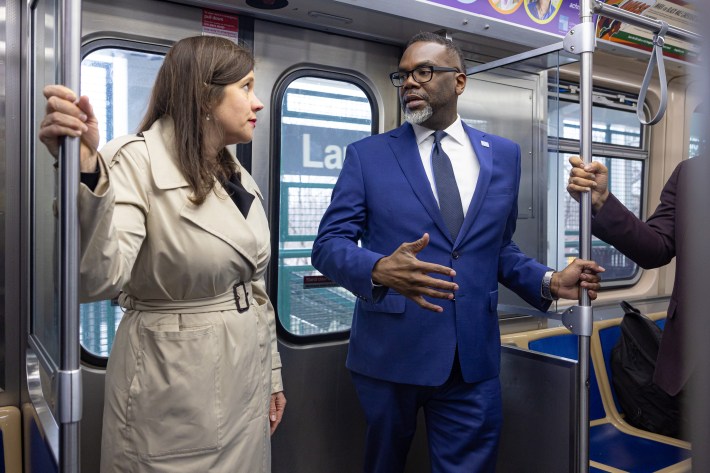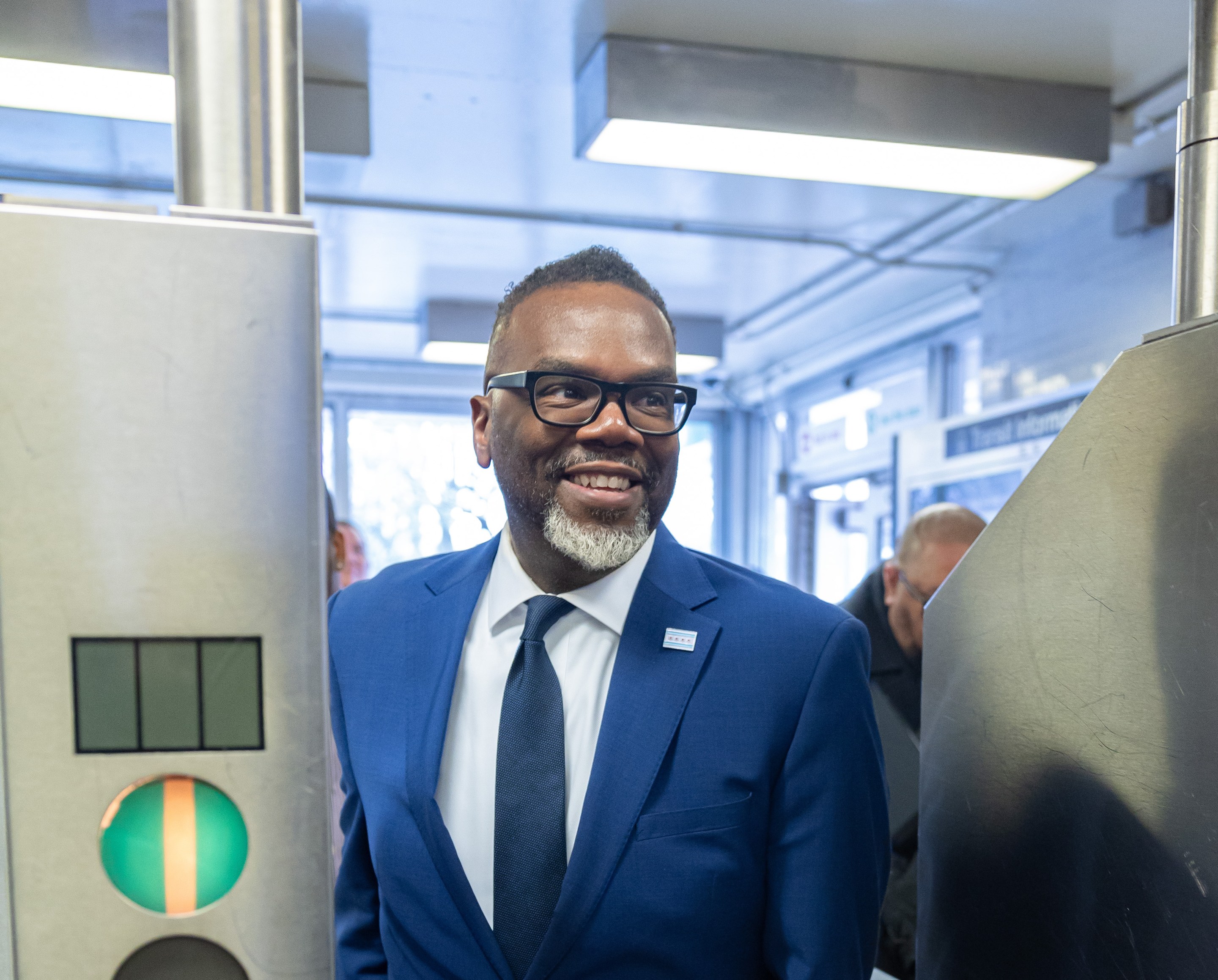
Streetsblog has interviewed just about all the key players in the surprising win for local sustainable transportation, when state lawmakers passed a transit reform/funding bill in the wee hours of October 31, aka the "Halloween Miracle." (Governor JB Pritzker, if you're reading this, call me maybe?)
But one other important figure in the discussion of saving and upgrading regional transit, whom I felt hadn't gotten much post-vote airtime on this topic, other than one article discussed below, is Chicago Mayor Brandon Johnson. So I reached out to his office, and the mayor was up for sharing his thoughts about the public transportation victory, as well as his recent announcement of plans to purchase and rehab our city's intercity bus terminal.
The interview has been edited for clarity and brevity.
John Greenfield: It goes without saying, this is a very challenging time to be mayor of Chicago and to live in Chicago in general, with lots of lots of conflicts going on. But fortunately, in the past week, we have had a couple of bright spots with transportation.
Obviously, the Illinois General Assembly passed the transit reform and funding bill. And then there was the announcement from the City that you folks are going to buy and rehab the Greyhound station, so that means we're not going to lose our intercity bus station in Chicago. That was great news.
First of all, how do you feel about the transit reform and funding bill that passed? I read the Tribune article on your feelings about the Northern Illinois Transit Authority that's going to replace the Regional Transportation Authority.
So just to double check, you're pretty comfortable with the idea that instead of appointing four out of the seven CTA board members, you're going to appoint a smaller percentage of the board members?

In the Trib article, Rep. Kam Buckner [one of the transit bill engineers] said it's going to make your job a little less stressful in that you won't be solely responsible for what the CTA is doing. So are you pretty OK with that setup?
Mayor Brandon Johnson: What I'm good with is the fact that we're focusing our policies and our investments around the interests of people and not politicians.
JG: Exactly.
MBJ: And that's been a failure of government for decades, and not just in Chicago but throughout our country. And this investment sets our public transportation system up to have certainly better days ahead. That was my top priority from the [IGA's] spring legislative session, going all the way into this fall vetos session. The city of Chicago drives [the Illinois] economy, so I wanted to ensure that our investments from Springfield reflect and, quite frankly, reward that.
JG: From what I observed, it seems like you deserve some credit for lobbying state lawmakers to pass this legislation. Is there anything else you want to point out that you feel you did to help make this happen?
MBJ: There are so many working people who rely on our public transportation system. Those are the stories that I took to Senate President [Don] Harmon, to House Speaker [Chris] Welch, to the governor, and to the lead sponsors in both chambers.
People have repeatedly have come to me and said, Mayor, we need a cleaner, a safer, and a more expansive public transportation system. It has to be faster, it has to be more reliable, it has to be affordable. And that's what ultimately landed in this investment.
As someone who relied on public transportation, prior to me becoming mayor, I know the hustle and demands that come with living in the city and raising a family. And so that was essentially my advocacy, speaking directly to our elected leaders in Springfield around the needs and demands of working people.
And this funding will allow us to invest in cleaner, safer trains, and for expansion of services, and faster buses. That's what was most important to be here. That's why I'm grateful that we were able to successfully help move different agenda along and get exactly what the people Chicago need and deserve.

JG: All right. So here's a little bit of a trickier question. Acting CTA President, Nora Leerhsen also seemed to do a pretty good job of advocating for this. And generally, she's very popular with transit advocates. They just feel like she's done a good job of being hands-on about improving the CTA with things like more frequent bus service. She seems to be a fairly regular CTA user, which which we appreciate.
I have seen some mixed stuff from from transit workers who aren't completely happy with her. Not that it appears that Acting President Leerhsen has done anything wrong with labor policy. It's just that some of the employees want better working conditions, and the buck stops with her.
MBJ: Absolutely.
JG: But she's going have a lot more ability to improve the CTA now that there's more funding. So here's the question I have for you, and if you need to bunt on this, no problem. But are you going to make her the permanent CTA president?
MBJ: I believe that as an interim [president] in this moment, [Leerhsen has demonstrated] a strong response and recognition around how we provide a safer and better experience for workers, as well as for riders. I have not made a determination just yet where I will land in choosing and determining who will ultimately lead our transit system.
But I can tell you that we've been incredibly laser-focused on improving conditions. And so it's not just about more frequent buses, and we've expanded that, or the 24-hour Orange Line to Midway Airport...
JG: Yeah, that's great news.
MBJ: Those are all great, great, great advantages to this investment. And we also have to address all the other matters that, unfortunately, our transportation system has inherited because we have a housing crisis in America, and we also have a mental health crisis, that we are addressing. A lot of that converges in our transportation system. And so those concerns are valid, and this investment is going to help us address them.
JG: All right. Now we've only got a couple minutes left, so let's pivot to talking about the bus station, which was the other great news this week. It's just been a really good week for transportation news.
Some transit advocates, such as the suburban transit expert Star:Line Chicago, are happy about the bus station being saved, but wondered, might there be a better location for the station?
The one on [630 W.] Harrison is pretty far away from other transit. Have you considered something like using the parking lot next to Metra's La Salle Street Station in the South Loop? I guess it would be a lot more expensive to build a station from scratch. What are your thoughts?
MBJ: First of all, I'm grateful that we've had some incredible advocates, pushing for the Greyhound station to be maintained and expanded. My administration worked hard to find a revenue stream [Tax Increment Financing money] to do just that. We're talking about 500,000 riders, many of them low-income or families. When we think about families, and women in particular, who are looking to flee other states where reproductive healthcare is not available, this is a mode of transportation that gives them an opportunity to come to the city of Chicago.
In terms of the exact location and where could there could be potential other opportunities to do it in a way that benefits all of the riders, my values have been expressed in the investment. As far as the details on this investment, I'm always open to it, but we want to make sure that we have the right location that ensures that more people can have access to this transportation investment.
JG: One more question. So I don't mean to be disrespectful to Philadelphia, but they've had some bad luck on transit stuff that has actually benefited Chicago. For example, the Pennsylvania legislature did not pass a transit funding bill in time, so Philadelphia's SEPTA had to cut service and raise fares. I think they're reversing that.
And then also Philadelphia didn't buy their bus station, and for a while, customers had to catch the bus while standing on the curb, and that wasn't good. They got a lot of complaints, so they reversed that decision.
So basically, Philadelphia's misfortune has been Chicago's fortune. Those situations in Pennsylvania and Philly helped people in Illinois and Chicago make better choices about transit, like you're doing with the bus station.

Just being light here, but have you thought about thanking the mayor of Philadelphia [Cherelle Parker] for this stuff by sending her a care package of Chicago treats, like Chicago-mix popcorn, Chicago-style pizza, Italian beef sandwiches, and maybe some Malört? Have you considered sending a box to their City Hall?
MBJ: [Laughs.] Look, Mayor Parker has had to face a lot of challenges, just like I have. [Lists several other big city mayors who've had similar difficulties.] I can go on and on. These challenges are real.
One of the things that we have learned in Chicago is that it makes more sense to invest in the front end of these services, because there's always these conversations about cost and whether or not there's an economic advantage to these investments. And my position is, if we're centering our work around the interests of working people and allow those demands and those hopes to be the center of our delivery of government, I believe we're always in a better, stronger position to make the right investment.
But as far as sending the care package to any other mayor, I mean, I don't think what we're doing in Chicago needs to be the impetus for a care package, I can just do that because I just happen to be a really, really nice guy.

Read the Tribune article here.

Do you appreciate Streetsblog Chicago's paywall-free sustainable transportation reporting and advocacy? We officially ended our 2024-25 fund drive in July, but we still need another $42K+ to keep the (bike) lights on in 2026. We'd appreciate any leads on potential major donors or grants. And if you haven't already this year, please consider making a tax-deductible donation to help us continue publishing next year. Thank you!





